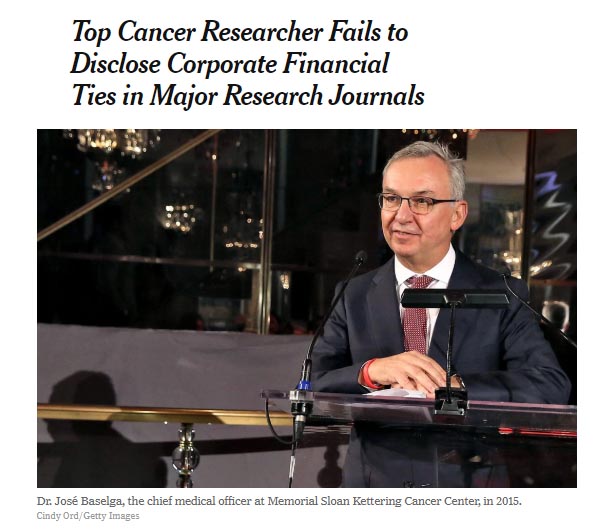Funding for research should come from a disinterested party. This isn’t the reality we live in. Most funding comes from large corporations who want validation for their existing products or expect a new product to be the result of the research. Funding thus creates an inherent bias that is the antithesis of scientific research. The reality of such funding has created new terminology within the field such as “corporate research” but the media has not adopted it. The media gives the public heavily biased information that has the integrity of science glossed over it. And dangerously, that conflict of interest bias is creeping into peer reviewed journals.
A recent CBS report stated:
“One of the world’s top breast cancer doctors failed to disclose millions of dollars in payments from drug and health care companies in recent years, omitting his financial ties from dozens of research articles in prestigious publications like The New England Journal of Medicine and The Lancet.” (1)
In this case, conflict of interest resulted misconduct such as:
“At a conference this year and before analysts in 2017, he put a positive spin on the results of two Roche-sponsored clinical trials that many others considered disappointments, without disclosing his relationship to the company. Since 2014, he has received more than $3 million from Roche in consulting fees and for his stake in a company it acquired.” (2)
STRICTER CONFLICT REGULATIONS
While such corporate sponsorship has undoubtedly produced results beneficial to the public good, such a relationship puts a serious strain on the integrity of academic research. The academy needs to enforce stricter rules mandating full disclosure of conflict of interest, including amounts individuals and organizations are paid. And perhaps a limit on how much a corporation can pay to influence research. One suggestion is the creation of a general corporate tax. The money would go into a pool fund for research that is then distributed by the government. This solution would raise its own problems.
Not all paid research produces untrustworthy results. But the general public has a right to question whether these medicines and protocols are in our best interest. Is research just producing the best financial results for big corporations? Has a more efficient, less profitable solution been deliberately overlooked? One has to suspect it may be if the researcher is being paid millions of dollars for his results. Ergo, we need full disclosure. Our lives may depend on it.
(1)(2) CBS News report
